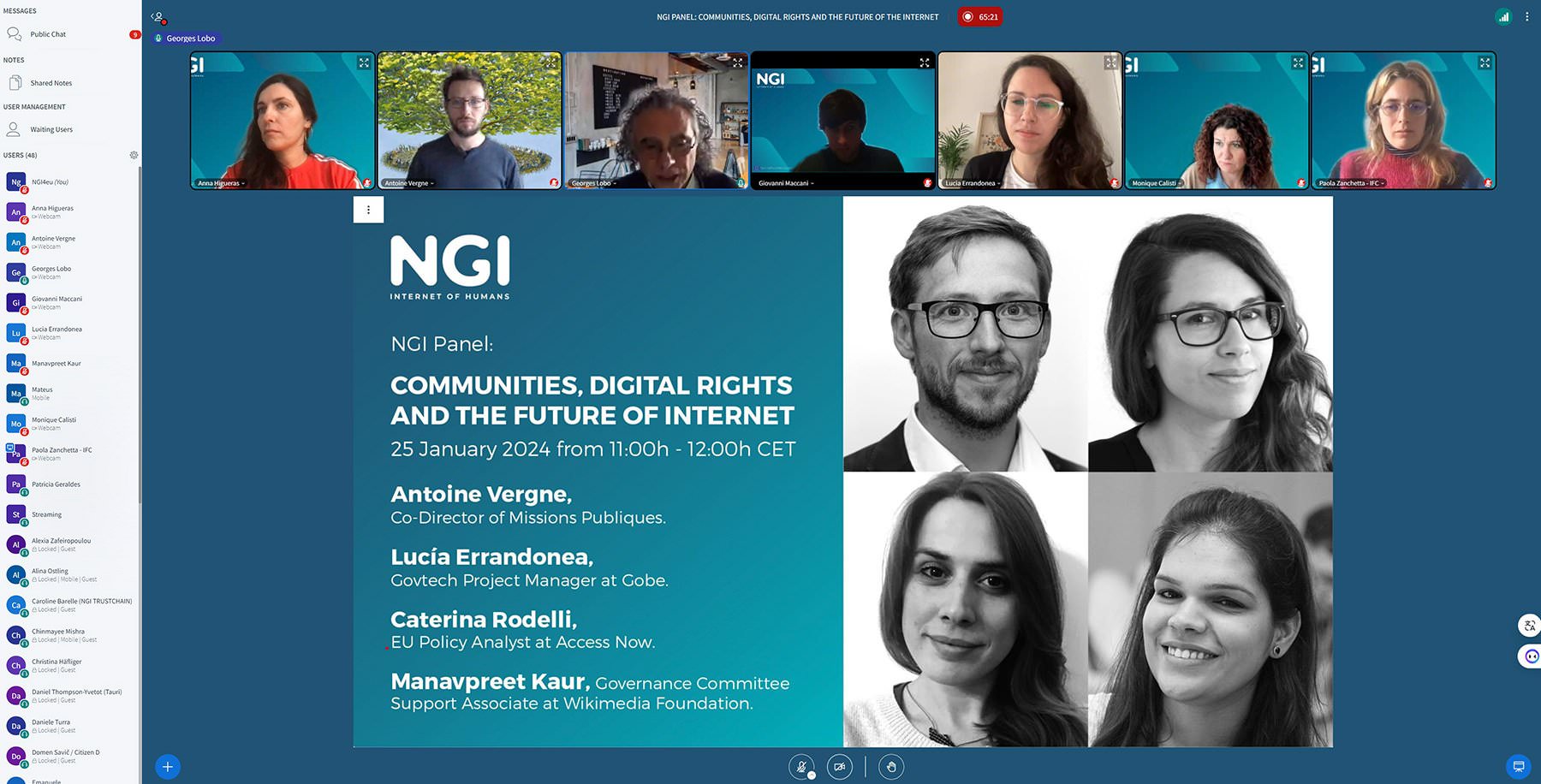In January 2024, the NGI Outreach Office organised the NGI Panel: Communities, Digital Rights & The Future of the Internet. Held online on Thursday, January 25th, this event is part of the European Commission’s NGI Initiative, striving to reshape the internet to reflect European values and norms.
Anna Higueras, the Head of Projects at Ideas for Change, a partner of the NGI Outreach Office, moderated the session, introducing the panel’s speakers and main points of discussion, after a brief introduction of Dr Monique Calisti, CEO of Martel Innovate and Director of the NGI Outreach Office.
Georges Lobo from the NGI Unit at the European Commission opened by providing an overview about the NGI initiative, including its core values and main achievements. He underlined the need for cohesive efforts across the whole community to make the internet universally accessible, giving a panoramic view of the Open Source EU’s policy framework and its relevance to shape an internet of trust.
The next speaker, Manavpreet Kaur from the Wikimedia Foundation, emphasised the importance of collaboration in creating open standards and fostering global dialogue about the internet’s future. Kaur highlighted Wikimedia’s role in enabling global participation in creating freely licensed educational content.
Antoine Vergne, Co-Director of Missions Publiques, addressed the complexities of internet impact and governance. He pointed out the dichotomy of the internet’s global reach versus the limited scope of national governance. Vergne stressed the need for long-term planning in global governance and advocated for the inclusion of ordinary citizens in discussions about internet governance to enrich and broaden the discourse.
Lucía Errandonea of GOBE and Algorights shared insights on the implications of AI from a social justice and human rights perspective, underscoring the necessity of inclusive and transparent technologies. Errandonea called for more formal platforms for cross-sector collaboration in AI’s design, implementation, and oversight.
The panel collectively advocated for an inclusive, human-centric approach to developing a future internet that is equitable, inclusive and sustainable. They urged the NGI to foster even broader collaboration and engagement of a variety of stakeholders, from innovators, to policy makers and civil society players in shaping a digital sovereign future for our society.

Giovanni Maccani, Ideas for Change’s Research Director, led the open discussion that followed, engaging with the panellists on policy and technological cooperation for shaping the internet’s future.
A crucial element of the debate emphasised that the future of the internet is not only about technology, or a matter for software developers only. Rather, arguments were made to extend participation and societal collaboration during the development of this emerging human-centric open source based internet infrastructure. All panellists shared their extensive experience in these challenges processes, arguing that this change would be part of a wider shift towards a much more diverse and inclusive internet governance ecosystem.
Another important topic discussed focused on the adoption of NGI outputs, and open source solutions more generally. The public sector is seen as one of the most prominent adopters of NGI products, and the key vehicle for embedding interoperable-by-design, secure and privacy-by-design solutions in public services and wider policies. Still, the panellists and the audience argued that a gap to be bridged still exists between public sector agencies and the open source communities. Supporting Open Source solutions through GovTech initiatives could ghep to bridge the gap. Errandonea and Vergne shared how they are tackling this complex field through acting as intermediaries, still acknowledging that the sustainability and business model of open source remains a key challenge to be addressed.
Maccani closed the discussion highlighting how important the role of NGI is, and specifically of the NGI Outreach Office to continuously raise awareness and promote NGI values and outputs as part of a wider cultural shift through its communication to non-experts and the general public.
The NGI panel concluded by inviting new innovators and key stakeholders interested in the program’s values and objectives to participate in its open calls. The aim is to expand its community of innovators to ensure the future internet in Europe is trustworthy, sustainable, accessible and inclusive for everyone. This initiative is part of the European Commission’s effort to shape the internet into an environment that meets people’s fundamental needs while adhering to European standards, values and principles.
The recording of the event is accessible on the European Commission NGI’s PeerTube profile
